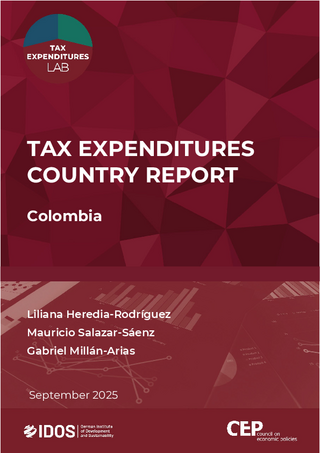Tax expenditures country report: Colombia
Heredia-Rodríguez, Liliana / Mauricio Salazar-Sáenz / Gabriel Millán-AriasBooks (2025)
German Institute of Development and Sustainability (IDOS)/Council on Economic Policies (CEP)
DOI: https://doi.org/10.23661/cr7.2025
Span. Ausg. u.d.T.:
Informe sobre gastos tributarios: Colombia
Tax expenditures (TEs) in Colombia accounted for approximately 7.8% of Gross Domestic Product (GDP) in 2022, broken down as follows: the fiscal cost of this expenditure was 0.6% in terms of personal income tax and 1.5% in terms of corporate income tax. The remaining 5.6% corresponded to VAT. In total, this represents a four-percentage-point increase on the previous year.
This report stresses the need to review TEs. Such an evaluation was already crucial before the pandemic, but has now become all the more urgent in the wake of COVID-19 and its impact on inequality and state revenue.
Transparency: there is no comprehensive data available on TEs in Colombia and the data that does exist is not accessible to researchers or the general public. In several cases, information is patchy or aggregated, making it difficult to evaluate.
Complex fiscal landscape: the Colombian tax system is complex, due in part to the numerous special exemptions, exclusions and deductions inherent in the regulatory framework. This complicates matters in terms of tax compliance, oversight and auditing.
Evaluation challenges: Colombia had no defined benchmark for determining its TE. While initial work was undertaken in mid-2024 to define a benchmark for income tax and VAT, the disaggregated report is not available at the time of writing this analysis. Additionally, the absence of effective and ongoing assessment to determine the appropriateness of tax benefits has led to an accumulation of incentives, many of them unjustified, and an increase in the country’s TE.
Fiscal sustainability: limited tax collection is impinging on the ability of the Colombian state to maintain healthy public finances and comply with its fiscal rule. This is not only the result of a stagnating economy, but also stems from numerous tax benefits that drive up TE. These benefits already corresponded to 7.4% and 7.8% of GDP in 2021 and 2022 respectively.
Policy recommendations: there is a need to restructure the Colombian tax system to make it more efficient, sustainable and equitable. Tax benefits must be reviewed and, in some cases, progressively removed in order to help achieve tax justice and streamline the system.

